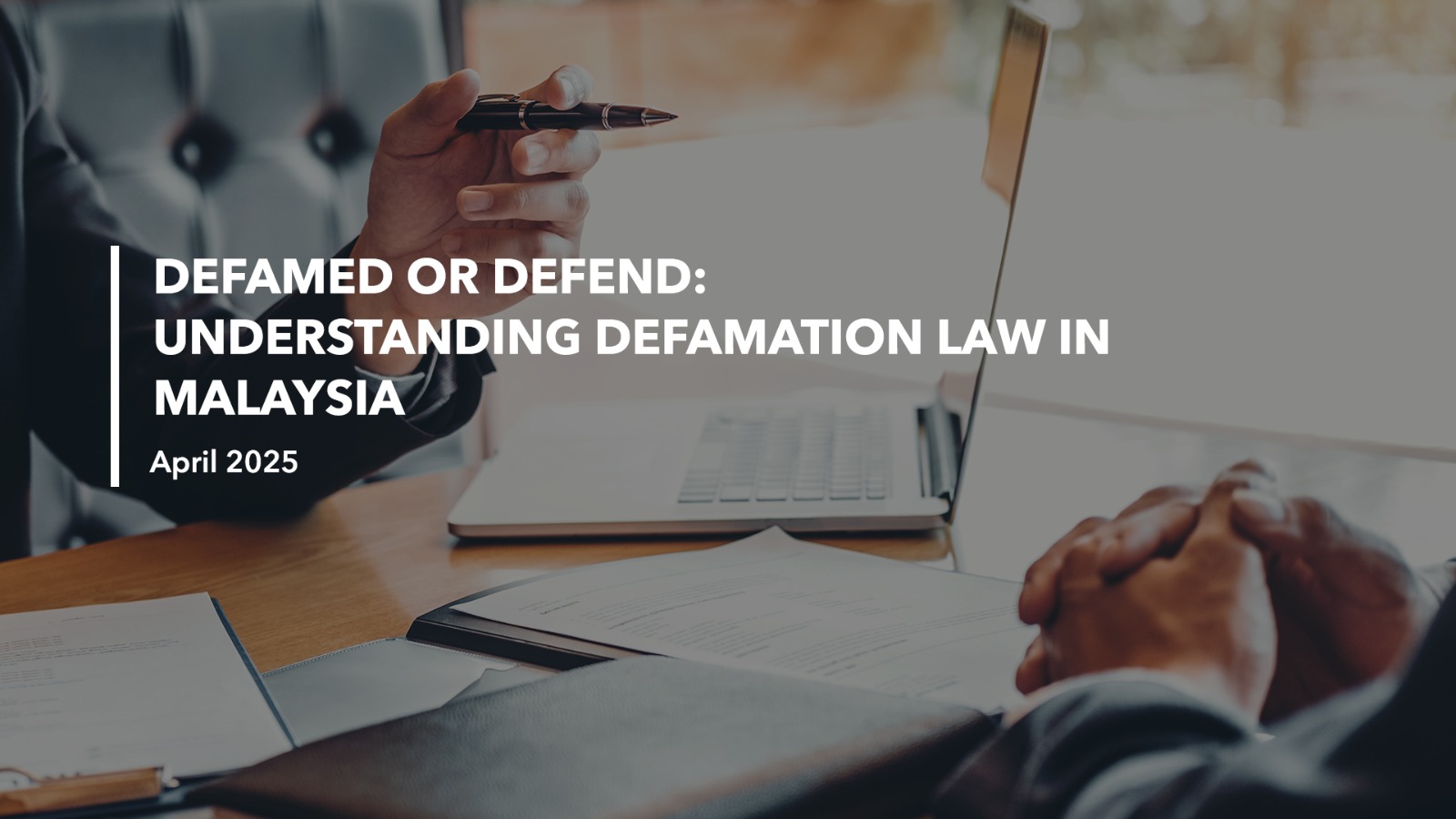An overview of what constitutes defamation, the available legal defences, and the role of the law in safeguarding reputations.
A. Introduction
Freedom of speech is a fundamental liberty guaranteed by Article 10 the Constitution of Malaysia. However, this freedom is not absolute as it does not extend to the freedom to defame and tarnish the reputation of another. This article provides a brief introduction to the law of defamation, exploring the key elements required to succeed in a defamation action and the defences available.
B. Overview of a Defamation Action
1. Generally, a defamation action is determined in two stages. During the first stage, the Plaintiff must prove the elements of defamation. Once the elements of defamation have been established, the Court will then determine if the Defendant successfully established the defences raised
2. The elements of defamation that the Plaintiff has to prove during the first stage are:
2.1. The statement in question (“Statement”) bears defamatory meaning;
2.2. The Statement referred to the Plaintiff; and
2.3. The Statement had been published to a third person.
3. During the second stage, the common defences that a Defendant could raise are:
3.1. Justification;
3.2. Fair Comment;
3.3. Qualified Privilege; and
3.4. Absolute Privilege.
C. Elements of Defamation
4. The Statement bears defamatory meanings
4.1. The first element that the Plaintiff has to prove is that the Statement bears defamatory meanings. This is usually the most contested element in a defamation action.
4.2. A defamatory statement is usually described as a statement, which:
(a) tends to lower a person in the estimation of right-thinking society generally or to cause him to be shunned or avoided or to expose him to hatred, contempt or ridicule; or
(b) imputes to the Plaintiff any dishonourable or discreditable conduct or motive, or a lack of integrity.
4.3. In order to determine whether a Statement bears a defamatory meaning, the Court will carry out a two tier-test as follows:
(a) First, the words used in the Statement will be construed in its natural and ordinary meaning, which includes both the literal meaning as well as any insinuation and inference drawn from the words. Thereafter, the Court will determine whether these natural and ordinary meanings are capable of conveying a defamatory meaning in theory.
(b) Once the natural and ordinary meaning of the Statement has been ascertained, the Court will then determine if the Statements are in fact defamatory. This is a question of fact, and the Court will consider the circumstances of the case including the source and context of the Statement made as a whole
4.4. Premised on the above, a Statement may well carry a defamatory meaning on the face of it, but the context of the Statement may well neutralize the Statement and take away the sting in the words. Therefore, the question of whether a Statement is defamatory in the eyes of the law involves various factors involving both questions of facts and law.
5. The Statement referred to the Plaintiff
5.1. It must be proven that the Statement refers to the Plaintiff. Where the Statement referred to the Plaintiff by name, there will generally be no dispute as to the issue of reference.
5.2. It is only if the Statement does not specifically mention the name of the Plaintiff that dispute arises. In that situation, the Court will apply an objective test and determine whether the words would reasonably in the circumstances lead persons acquainted with the Plaintiff to believe that the Plaintiff was the person referred to.
6. The Statement has been published
6.1. To constitute defamation, the Statement must be published as there will be no damage on the reputation of the Plaintiff if no one else heard or read the Statements.
6.2. Publication must be made to a third party, aside from the Plaintiff and the Defendant. In this regard, a Statement which is published on the internet will usually be considered to have been published as people all over the world could get access to the Statement.
D. Defences in Defamation
7. Justification
7.1. Justification provides a complete defence to the Defendant in a defamation action. To establish justification, the Defendant must prove that the defamatory imputations of the Statement are true. It is insufficient to merely prove that the defendant believed that they were true.
7.2. In a defamation action, once the Plaintiff succeed in establishing the three elements of defamation above, the law presumes that the statements are false. Therefore, the Defendant bears the burden in providing the truth of the Statement.
7.3. An allegation published by repeating a rumour cannot be justified by proving that there was such a rumour. The substance of the defamatory statement must be proven, and mere averments are insufficient to discharge the defendant’s burden of proof.
8. Fair Comment
8.1. In order to succeed in the defence of fair comment, the Defendant must prove that:
(a) The words complained of in the Statement are comments instead of a statement of fact;
(b) The comment is on a matter of public interest;
(c) The comment is based on facts; and
(d) The comment is one which a fair-minded person can honestly make based on the facts proved.
8.2. A comment is generally described as a statement of opinion based on facts. Typically, if a statement appears to be one of opinion, it is capable of being a comment. However, the issue of whether the Statement is a statement of fact or comment is usually highly disputable, and it depends on the facts of every case.
8.3. After establishing that the impugned statement is indeed a comment, the comment must be one which is made on a matter of public interest. A matter is of public interest if it could affect people at large so that they may be legitimately interested in what is going on or what may happen to them.
8.4. Next, the Defendant must show that the comment is made based on facts. The Defendant must prove such facts.
8.5. Lastly, the comment must be made fairly such that it is one which a fair-minded person can honestly make based on the facts proven. Therefore, if it is proven that the Statement was published with malice to injure the reputation of the Plaintiff, the defence of Fair Comment will fail.
9. Qualified Privilege
9.1. The defence of qualified privilege means that the Statement was made on an occasion where the Defendant has a legal, social or moral interest or duty to make such Statement to the person receiving such information. Similarly, there must also be a corresponding interest or duty on the part of the person to whom the communication is made to receive such information.
9.2. The question of whether an occasion is privileged depends on the circumstances of each case, the nature of the information and the relation between the speaker and the recipient.
9.3. Typically, qualified privilege may be applicable if the Statement was addressed to a person or body having jurisdiction or control over the person whose conduct is impugned or any power or duty to grant redress, or inquire into, the complaint made in the impugned statements.
9.4. The defence of qualified privilege was founded on grounds of public policy such that protection ought to be given for a particular communication to be made. Therefore, where there is malice on the part of the Defendant, the defence of qualified privilege would be inapplicable.
10. Absolute Privilege
10.1. As the name suggests, the defence of absolute privilege is an absolute defence. Even if there is malice on the part of the Defendant to tarnish the reputation of the Plaintiff, this defence remains applicable. This means that an injury of reputation inflicted maliciously by a defendant through the defamatory statements will go unredressed if absolute privilege is held to be applicable.
10.2. Due to this far-reaching consequence, the Courts have traditionally been quite conservative in the application of the defence of absolute privilege. Below are examples of such instances:
(a) Statements made in the presence of the Court or in the course of legal proceedings by judges, counsels, witness and including contents of documents put in as evidence; and
(b) Statements contained in a police report lodged or a statement made under Section 112 of the Criminal Procedure Code.
10.3. Generally, absolute privilege is only applicable if the overriding public interest that a person should be encouraged to make the Statement outweighs the consideration for protection of reputation of a person.
E. Conclusion
With the proliferation of the internet and various social media platforms, both individuals and businesses are increasingly at risk of reputational harm, as well as the potential for being sued for defamation. As such, navigating the complexities of defamation law is more important than ever.
The law of defamation in Malaysia is complex and requires a detailed analysis and careful consideration of various factors. The question of whether a Statement constitutes defamation involves both questions of facts and law to be determined by the Court. Defences such as truth, fair comment, and privilege may be available depending on the specific facts of the case. Given the nuances involved in defamation claims, it is essential for anyone facing potential defamation issues to seek legal advice to protect their rights and interests.
© TSL Legal
This article is intended to provide general information only and does not constitute legal advice. It should not be used as a substitute for professional legal consultation. We recommend seeking legal advice before making any decisions based on the information available in this article. TSL Legal fully disclaims responsibility for any loss or damage which may result from relying on this article.
Should you have any questions on defamation law in Malaysia or how it may affect you or your business, please get in touch with the following person:



